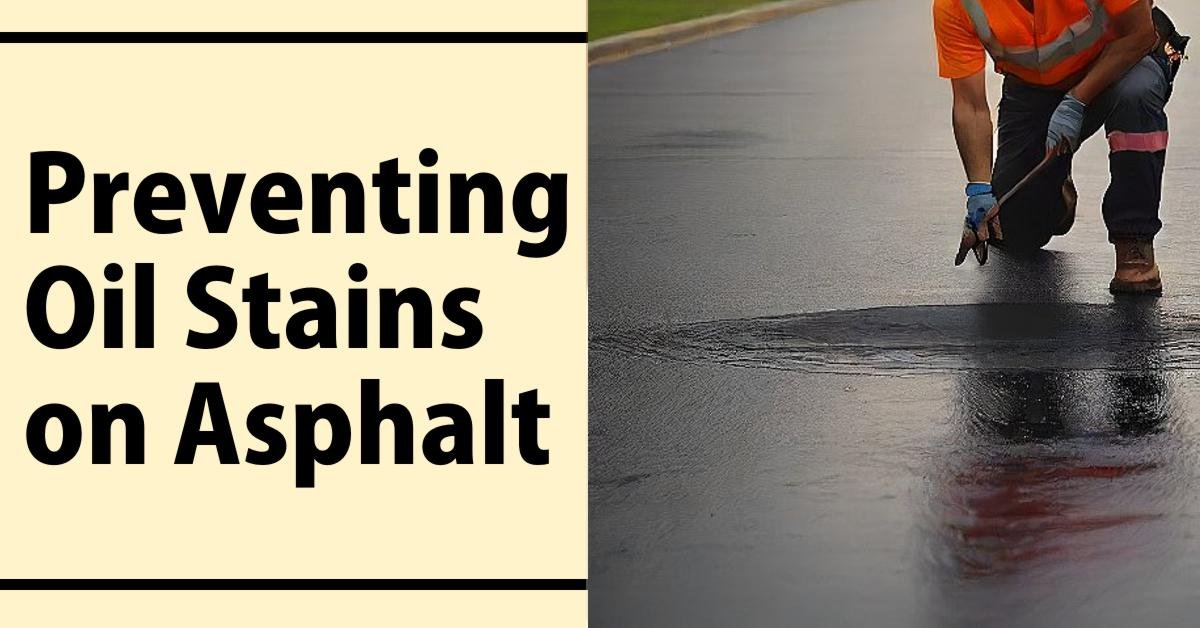In addressing the challenge of preventing oil stains on asphalt surfaces, incorporating seal coating and proactive maintenance measures is crucial. These strategies not only enhance the aesthetics of asphalt but also prolong its lifespan by protecting it from oil penetration and stains.
Sealcoating Explained:
I always recommend sealcoating for asphalt surfaces to enhance durability and provide a robust barrier against oil stains Because sealcoating is a critical process in maintaining the integrity and appearance of asphalt surfaces.

Durability of Sealcoating
The durability of a sealcoat is one of its most valued attributes. When properly applied, a sealcoat can provide a robust protective layer that shields asphalt from the damaging effects of weather, UV radiation, and chemical spills. Over the years, I’ve observed that a high-quality sealcoat can significantly enhance the resilience of asphalt surfaces, preventing cracks, potholes, and other forms of deterioration.
Sealcoating materials are designed to withstand heavy traffic and environmental stressors. The durability of the sealcoat ensures that the asphalt beneath remains intact and functional, reducing the need for frequent repairs. For anyone looking to preserve their asphalt surfaces, investing in a durable sealcoat is a cost-effective strategy that pays off in the long run.
Application Frequency of Sealcoating
Application frequency is another crucial aspect of sealcoating. The general recommendation is to apply a sealcoat every 2 to 3 years, depending on the level of traffic and environmental conditions the asphalt is exposed to. In my experience, regular application of sealcoat is vital to maintain its protective properties.
For instance, asphalt surfaces subjected to heavy vehicular traffic or harsh weather conditions may require more frequent sealcoating. On the other hand, surfaces in milder climates with less traffic can maintain their integrity with less frequent applications. It’s important to assess the specific needs of your asphalt to determine the optimal sealcoating schedule.
Effectiveness Against Oil Penetration
One of the primary reasons for sealcoating is its effectiveness in preventing oil and other substances from penetrating the asphalt surface. Asphalt is naturally porous, making it susceptible to oil, gasoline, and other chemical spills. These substances can seep into the asphalt, causing it to weaken and deteriorate over time.
Sealcoating creates a non-porous barrier that protects the asphalt from such infiltrations. From my professional standpoint, I’ve seen how a well-applied sealcoat can prevent oil stains from becoming a permanent blemish on asphalt surfaces. This protective layer not only enhances the appearance of the pavement but also prolongs its structural integrity.
When an oil spill occurs, the sealcoat ensures that the oil remains on the surface, making it easier to clean up without causing damage. This is particularly beneficial for commercial properties with high traffic, where oil spills are more frequent. By effectively preventing oil penetration, sealcoating helps maintain the quality and longevity of asphalt surfaces.
Quick Spill Cleanup:
Promptly address oil spills using absorbent materials like cat litter or sawdust. This prevents oil from penetrating the asphalt and reduces the likelihood of stains.
Regular Surface Inspections:
Regularly inspect asphalt surfaces for signs of oil stains, cracks, or damage. Early detection allows for timely repairs and prevents stains from becoming ingrained.
Proper Vehicle Maintenance:
Ensure vehicles parked on asphalt are well-maintained to prevent leaks:
- Regular oil changes and fluid checks help minimize the risk of leaks.
- Use drip pans or absorbent pads under vehicles prone to leaks to catch oil before it reaches the asphalt.
Conclusion:
By integrating seal coating into your maintenance routine and adopting proactive measures like quick spill cleanup and regular inspections, you can effectively prevent oil stains on asphalt. These practices not only preserve the appearance of your pavement but also contribute to its longevity and durability.
